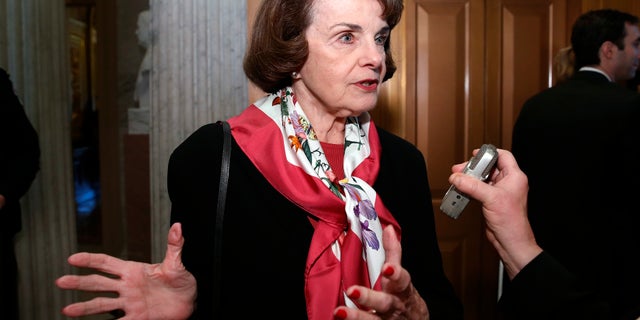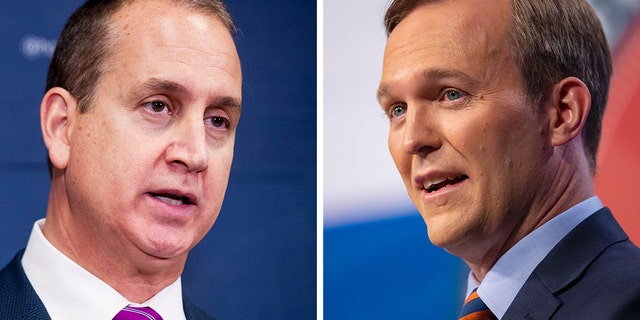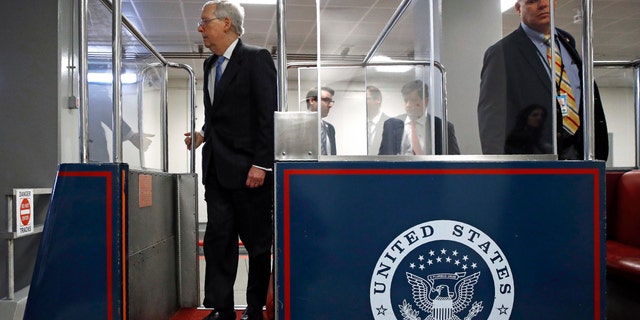
WASHINGTON
(AP) — Members of President Donald Trump’s economic team convene Friday
on Capitol Hill to launch negotiations with Senate Republicans and
Democrats racing to draft a $1 trillion-plus economic rescue package
amid the coronavirus outbreak.
It’s the biggest effort yet to shore up households and the U.S. economy as the pandemic and its nationwide shutdown hurtles the country toward a likely recession.
Senate
Majority Leader Mitch McConnell unveiled the Republican opening offer
to pump $1,200 direct checks to taxpayers, $300 billion for small
businesses to keep idled workers on payroll and $208 billion in loans to
airlines and other industries.
The GOP leader’s effort builds on Trump’s request for Congress to “go big.”
“We need to take bold and swift action as soon as possible,” McConnell said Thursday, announcing his plan on the Senate floor.
The
247-page McConnell CARES Act puts the leader’s imprint on opening talks
with Democrats in Congress as lawmakers prepare to work through the
weekend to fast-track perhaps the most urgent legislative undertaking
since the 2008 financial crisis.
The
negotiations are certain to encounter difficulties ahead, despite the
pressure on Washington to act. Trump’s Treasury Secretary Steven Mnuchin
and economic adviser Larry Kudlow will meet behind closed doors with
Senate leaders. Democrats say the Republican plan does not go far enough
and some Senate Republicans object to certain provisions.

“We
are beginning to review Senator McConnell’s proposal and on first
reading, it is not at all pro-worker and instead puts corporations way
ahead of workers,” said a joint statement from House Speaker Nancy
Pelosi and Senate Democratic Leader Chuck Schumer.
The
GOP leader’s plan aims to shore up households, businesses and the
healthcare industry, which is bracing for an expected onslaught of
patients falling ill from the virus that causes COVID-19.
The
one-time $1,200 stipends would be sent to individuals — $2,400 for
couples — phased out at income thresholds of $75,000 for individuals and
$150,000 per couple. Additionally, there would be $500 payments for
each child.
Additionally,
the McConnell bill would provide $300 billion to small businesses, with
loans that would eventually be forgiven for employers who use them to
meet payroll expenses.
To
shore up industry, McConnell’s plan would provide $208 billion in loans
and loan guarantees to distressed sectors, including $50 billion for
commercial airlines, $8 billion for air cargo carriers and $150 billion
for other eligible businesses, but those loans would have to be paid
back.
Businesses would also be allowed to defer payment of the 6.2% employer payroll tax.
The
proposal also includes a specific provision to allow the Treasury
secretary to “participate in the gains,” through stock options or other
financial instruments, of companies that receive federal aid.
At the same time, caring for the expected surge of sick Americans is a priority for Congress.
The
McConnell proposal contains a raft of health care provisions —
including permanent liability protection for the manufacturers of
respirators and other desperately needed medical gear to handle the
pandemic.
At
the consumer level, McConnell’s bill would put into federal law the
commitment from insurers that coronavirus tests will be cost-free to
policy holders. Additionally, the bill requires coverage of coronavirus
vaccines, at no cost to patients.
For
the health care industry, the bill would establish a new Medicare
payment for treating COVID-19 patients. It would suspend through the end
of this year a 2% Medicare payment cut to providers under previously
set budget restraints.
Pelosi
and Schumer said in statement they looked forward to working with
Republicans “in a bipartisan way to deliver for the American people as
soon as humanly possible.”
The
Democratic leaders said, however, their priority is to “make sure all
workers are protected from the loss of a paycheck or that no family
falls into financial ruin because of this pandemic.”
The
Democratic leaders called on Trump to ramp up production of medical
supplies and rapidly erect temporary field hospitals under new
authorities he has invoked in the Defense Production Act.
Keeping paychecks flowing for idled workers as jobless claims skyrocket is a top priority for both Republican and Democratic plans emerging from Congress.
But
how best to send direct payments to Americans — as one-time stipends,
ongoing payroll support or unemployment checks — is a crucial debate.
Democrats
have other ideas for ushering aid to Americans by pushing more money
into the existing unemployment insurance system. Schumer called it
“employment insurance” — which he characterized as “unemployment
insurance on steroids.”
Some
GOP senators panned the idea of direct one-time checks, preferring
instead to use the federal dollars to keep workers who are asked to stay
home on business payrolls.
“What I want is income, not one check,” said Sen. Lindsey Graham, R-S.C.
Meanwhile,
industries of all kinds are lining up for help. The total price tag is
sure to grow beyond $1 trillion, lawmakers said.
Trump
has already signed into law a $100 billion-plus bill to boost testing
for the coronavirus and guarantee paid sick leave for millions of
workers hit by it. Earlier, Trump signed an initial $8.3 billion package
from Congress.
For
most people, the new coronavirus causes only mild or moderate symptoms,
such as fever and cough. For some, especially older adults and people
with existing health problems, it can cause more severe illness,
including pneumonia.
The
vast majority of people recover from the new virus. According to the
World Health Organization, people with mild illness recover in about two
weeks, while those with more severe illness may take three to six weeks
to recover.
___
Associated
Press writers Darlene Superville, Matthew Daly, Mary Clare Jalonick,
Ricardo Alonso-Zaldivar and Padmananda Rama in Washington contributed to
this report.
___
The
Associated Press receives support for health and science coverage from
the Howard Hughes Medical Institute’s Department of Science Education.
The AP is solely responsible for all content.















